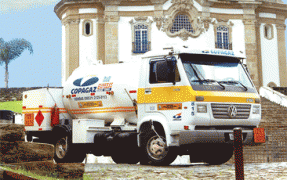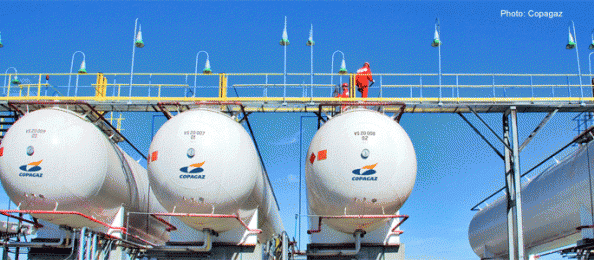Global Warming and Risk Management
Recognizing that climate change has become a worldwide challenge, Copagaz made this a priority. A signatory of the UN Global Compact since 2003, in 2008 Copagaz became a member of the Caring for Climate initiative. In 2009, at the United Nations Leadership Forum on Climate Change, held by the Global Compact at UN headquarters in New York, Copagaz also became a signatory of the Copenhagen Communiqué on Climate Change, conceived at Cambridge University and led by Prince Charles of the United Kingdom.
Copagaz is a company that is concerned about its performance. A pioneer in its field with respect to sustainability, the company has guided efforts to improve its internal processes on the way toward responsible management that is based on mitigating its environmental impacts and strengthening its relationship with its principal stakeholders.
In this sense, climate change constitutes one of the underlying issues for Copagaz that will be guiding its activities in the coming years. This article will recount some of the internal initiatives that the company has been implementing to improve its management and bring it into alignment with an economy of low emissions. These efforts have been geared primarily toward the logistics involved in the distribution chain, and some of the results can be reviewed below.
Copagaz Distribuidora de Gás Ltda. is a large-scale, privately held Brazilian company that is a traditional and family enterprise. It operates in the segment that bottles and distributes liquefied petroleum gas (LP Gas), and is the fifth largest company in this industry in Brazil. Founded in 1955 by its current president, Ueze Elias Zahran, Copagaz has established a trajectory of solid and continuous growth, based on an awareness of the fundamental importance of its product in the everyday lives of its clients. With a presence in nine of Brazil’s states and the Federal District, Copagaz directly employs 1,246 staff members in more than 20 municipalities.
Renewal of the fleet
The Department of Logistics has undertaken to develop and implement programs and actions that achieve effective logistical, financial, and commercial results for the company while they help to improve its performance in sustainability. The main initiatives that have been implemented are related to the modernization of its fleet with more efficient vehicles, and the creation of programs to optimize distribution processes and reduce distances traveled. These actions help to improve the quality of life for drivers, minimize the risk of highway accidents, reduce freight costs and, primarily, mitigate environmental impacts related to the emission of pollutants.
Since 2005, the market has been adopting as a standard tank trucks with a greater capacity of 30 tons. Having observed this trend in 2008, Copagaz invested approximately R$2.43 million (US$ 1.4) in the purchase of 18 new tank trucks of this specification, bringing about a reduction of approximately 392 trips a year on the central-western route in Brazil alone.
In a forward-looking and preventive fashion, Copagaz inaugurated a policy of fleet modernization in 2001 whereby its vehicles would have to be replaced every six years. This target for truck replacement has not only been implemented successfully, but it has also been exceeded, considering that, as of now, the average age of fleet vehicles is three years. Beyond this, the new fleet purchased at the start of 2005 is part of the generation of Euro 3 electronic engines, which in Brazil means that they are in compliance with the resolutions of the National Council on the Environment (Conama - Conselho Nacional do Meio Ambiente).
The logistical team is also working to improve the levels of the fleet’s productivity through training (economic guidance), optimization of routes (fewer kilometers driven per ton delivered), and having dealers raise clients’ awareness by arranging deliveries during off-peak hours, particularly in metropolitan areas.

Mapping of vehicles
Since 2008, all Bob-Tail trucks for the transport and delivery of LP Gas in bulk are equipped with a Global Positioning System (GPS), enabling them to verify the truck’s position en route, and to make adjustments to the itinerary after the trip is over, thereby increasing environmental efficiency and effectiveness in the execution of services.
This system makes it possible for the Department of Logistics to constantly evaluate and monitor the route taken by vehicles, thereby enabling staff to reorganize and restructure itineraries if they detect any sort of inefficiency or see opportunities to optimize routes. Another major factor is that the program has significantly reduced the number of overtime hours worked by drivers, which has added up to a reduction of costs for the company while improving the quality of life and lowering the risk of highway accidents.
Conceived by the Committee on Business Sustainability and implemented with the support of the Logistics, Sales, and Industrial departments, the mapping of the vehicle fleet was carried out during the second half of 2009. Nearly 4,000 people were involved in the execution of the work. In total, more than 4,500 vehicles were registered, including cars, motorcycles, utility vehicles, and trucks.
This action will make it possible for Copagaz to establish specific strategies for risk management relating to the environmental impacts of its activities. The mapping consists of an initial phase to improve the process for measuring emissions resulting from all distribution activities, which can then be extended to the company as a whole. Beyond this, from a risk-management perspective, Copagaz can work more closely with this strategic constituency – and from a position of greater strength – by developing initiatives to reduce environmental impacts and aligning itself with a low-carbon economy.
It is important to emphasize that the mapping initiative seeks to keep Copagaz in alignment with the commitments it has undertaken with the UN Global Compact to disseminate its Ten Principles, as well as the Caring for Climate initiative, aimed at reducing emissions in the production process.
This project description was originally presented in the Global Compact International Yearbook 2010.
Elizete Neto Tavares Paes is Assessor of the President at Copagaz in Brazil.
José Pascowitch works at Copagaz.
About Us // Privacy Policy // Copyright Information // Legal Disclaimer // Contact
Copyright © 2012-2018 macondo publishing GmbH. All rights reserved.
The CSR Academy is an independent learning platform of the macondo publishing group.









